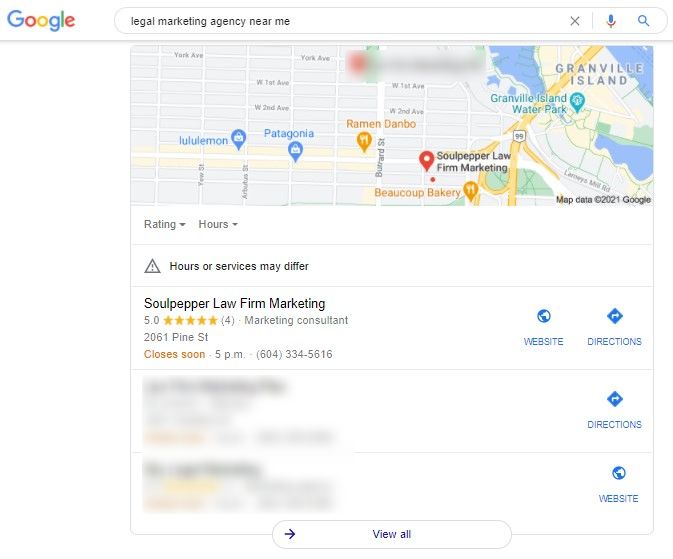As a lawyer, you should be reaching a somewhat local audience online. Perhaps not all of your clients live in the direct neighbourhood of your office, but a lot of them are likely in the same city, metropolitan area, or state as you.
In this segment of the SEO Essentials series, I will focus on the search engine optimization strategies you can implement to reach your local target audience more effectively.
I will explain the mechanisms and benefits of local SEO and look into how Google My Business plays a big part in local SEO optimization.
If you missed our previous SEO Essentials for lawyers, catch up now:
- Search Engine Optimization: SEO Setup Checklist
- Search Engine Optimization: Keyword Research and Competitive Analysis
- Search Engine Optimization: Content Strategy
What is local SEO?
Local SEO is an umbrella term for a set of best practices and strategies you can implement to improve your visibility in search results when people who are close to your physical location (potential local clients) search for phrases related to your services.
Here’s an example – optimizing for local SEO can help an LA-based law firm show up in local search results when someone in Los Angeles searches for ‘family lawyer near me’ or ‘best family lawyer in Los Angeles’.
Surfacing in such searches is particularly valuable because it places your content in front of a relevant audience with specific intentions. A person looking up legal offices in their area is likely past the point of general research and should be ready to take the next step, i.e. schedule a consultation, or at least shortlist offices they want to contact.
Who should be interested in local SEO?
Any business with a brick and mortar location or a defined service area can benefit from local SEO. Simply speaking, if you are connecting with clients anywhere else than online, you should be interested in improving your visibility in local search.
Legal services naturally attract local target clients. Legal proceedings can span over weeks or months. The convenience of working with a local law firm affects many clients’ decisions as to which law firm to pick. So naturally, law firms should be just as interested in local SEO as any other business with a physical location.
What affects local SEO?
When selecting pages to display in the SERP (search engine result page), Google uses a number of ranking factors to determine what the user should see.
Here are the key search factors that affect local SEO:
Relevance
In layman’s terms, this component of Google’s local algorithm reads your website and tries to make sense of it.
If you want Google to categorize your content as relevant to searches pertaining to the area of law that you practice, make sure you’re using the right keywords across the board (in URLs, meta titles and descriptions, in the content itself) and that your website is home to a wealth of content related to your area of expertise.
Prominence
Prominence is a ranking factor that ranks your website against your competitors and tells Google how reliable your business is. You can build prominence through creating and sharing local content (e.g. articles touching on local news), being active on social media, acquiring positive reviews for your firm, and implementing a link strategy.
Proximity
Sometimes there are many relevant and prominent web pages that can be displayed on the SERP. In such cases, proximity can affect the order in which they appear. This factor is unique to local SEO.
If you do a good job optimizing your website for local visibility, you get a chance of appearing in 3 types of local searches:
- Geo-modified searches, e.g. family lawyer in Los Angeles
- Non-geo-modified searches, e.g. family lawyer
- ‘Near me’ searches, e.g. family lawyer near me
In the last two cases, proximity is determined by the user’s location and how their geographic area correlates with where your firm is located.
How to optimize for local SEO
When describing the 3 search factors that affect local SEO, I already mentioned a few strategies you can implement to improve your visibility in local search:
- Consistently using the right keywords
- Optimizing meta tags and URLs
- Publishing relevant blog posts
- Acquiring positive reviews
- Building a strong social media presence
- Promoting your page through link strategy
But there’s one strategy that can take your local SEO efforts to the next level:
Optimizing your Google My Business listing.
Google My Business is a free tool that allows businesses to create profiles on Google. Think of your Google My Business listing as your virtual business card, or a filtered version of your website.
A well-optimized GMB listing gives Google all the information the search engine needs to identify your business as local. The information from your GMB profile is used to place your pages in relevant SERPs (in the form of traditional or local pack results – see image below), in Google Maps search results, and in mobile searches.

Local Pack results
The key to optimizing your Google My Business listing is thoroughness. Make sure that you fill in all the information the form asks for, including categories, your business description, and photos. You will also want to keep your listing active by adding posts regularly and replying to client reviews.
If at this point you’re not convinced that Google My Business is worth your time, remember that its role goes beyond helping you surface in local search. Once your potential clients come across your listing, they can immediately interact with it – visit your website, give you a call, or ask for directions to your office. This boosts your chances of converting users with a shorter attention span, e.g. mobile users or potential clients looking to quickly get in touch.
Looking for help with local SEO?
If you need help optimizing your website for visibility in local search, our agency is here for you. Our team of leading SEO experts will help you develop a bespoke action plan, implement on- and off-site optimization strategies, and outrank competitors in Google’s local rankings.
Soulpepper Legal Marketing has helped numerous law firms of different sizes and budgets succeed, and we look forward to helping you grow your firm. Give us a call or get in touch via our contact form to see what we can do for you.

